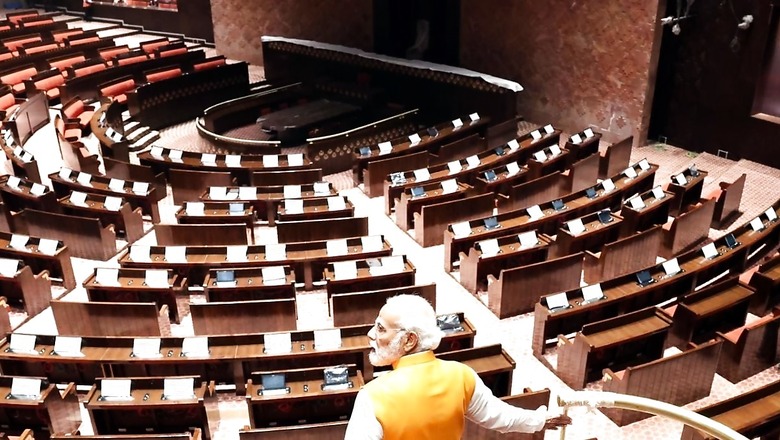
views
The inauguration of the new Parliament building on Sunday by Prime Minister Narendra Modi will be held in two phases and will include puja, installation of the ‘Sengol’, screening of two short films and release of a commemorative coin and stamp, reports said on Thursday.
Full Schedule of the Inauguration Ceremony of New Parliament House
- The program will commence at 7:30 am with a havan (a ritualistic fire ceremony) and puja (worship) near the Mahatma Gandhi statue. Dignitaries present during this time will include Prime Minister Narendra Modi, Lok Sabha Speaker Om Birla, and Rajya Sabha Deputy Chairman, among others.
- Following the puja, the installation of Sengol inside the Lok Sabha will take place between 8:30 am and 9:00 am.
- At 9:30 am, a prayer meeting will be held, attended by Shankaracharya, scholars, pundits, and saints. Adi Shiva and Adi Shankara may also be worshipped during this prayer meeting.
- The second phase of the program will begin at 12 pm with the national anthem. Two short films will be screened on this occasion.
- The messages from the Vice President and the President will be read out by the Deputy Chairman of Rajya Sabha. Additionally, the Leader of the Opposition in Rajya Sabha will address the gathering.
- Lok Sabha Speaker Om Birla will also deliver a speech, and a commemorative coin and stamp will be released during the event.
- The program will conclude with an address by Prime Minister Narendra Modi, scheduled for approximately 2:30 pm.
Union Finance Minister Nirmala Sitharaman said that 20 ‘aadeenams’ from Tamil Nadu, including Tiruvavaduthurai, Perur, and Madurai, have been invited for the inauguration of the new Parliament building on May 28. The Sengol, a sceptre that was used to symbolise the transfer of power from the British to the people of India in 1947, will also be installed in the new Parliament building.
In Tamil, the term ‘Aadeenam’ refers to both a Shaivite monastery and the head of such math.
The aadeenams were invited in recognition of Tamil Nadu’s role in the independence movement, Sitharaman said. Tamil Nadu has a “big proud part” when the Sengol (sceptre) was handed over to the first Prime Minister, Jawaharlal Nehru, symbolising the transfer of power from the British to the people of India, she said.
The decision to install the Sengol in the new Parliament was made based on the advice of the Tiruvavduthurai adheenam, following consultations between the late CR Rajagopalachary and the Shaivite pontiff, following consultations with Nehru regarding the matter.
“The pontiffs will attend the event, there will be Oduvars (scholars in Shaivite scriptures and hymns) who will recite the Thevaram. In 1947 also the Sengol was handed over to Nehru when othuvargal recited Kolaru Pathigam,” she said.
Former Prime Minister Manmohan Singh, former Lok Sabha Speaker Shivraj Patil, Congress President, and Leader of the Opposition in the Rajya Sabha Mallikarjun Kharge, along with leaders from various opposition parties, have received invitations for the inauguration event.
The Opposition has strongly objected to the decision of having Prime Minister Narendra Modi inaugurate the building, alleging that it undermines the esteemed constitutional role of the President of India, terming it an act of disrespect.
At least 21 opposition parties have declared their boycott of the function, while 25 parties, including 18 constituents of the ruling National Democratic Alliance (NDA) and seven non-NDA parties, will be present at the event on Sunday.
A plea was also filed in the Supreme Court seeking direction to the Lok Sabha secretariat for the inauguration of the new Parliament building by President Droupadi Murmu. The plea argued that the President is the only person who can inaugurate the new Parliament building and that the Lok Sabha secretariat and the secretary general, Lok Sabha, do not have the authority to do so.
The National Democratic Alliance, led by the Bharatiya Janata Party, has described the opposition’s stance as a “direct disrespect to the democratic principles and constitutional values of our esteemed nation.”
All About New Parliament Building
The new Parliament building, shaped like a triangle and spanning four floors, encompasses a built-up area of 64,500 square meters. It features three main gates known as Gyan Dwar, Shakti Dwar, and Karma Dwar.
The existing Parliament building, which was completed in 1927 and is now 96 years old, has been deemed insufficient to meet the requirements of modern times.
Constructed by Tata Projects Ltd, the new Parliament building includes a magnificent Constitution Hall to showcase India’s democratic heritage, a lounge for Members of Parliament, a library, multiple committee rooms, dining areas, and ample parking space.
The present building served as India’s first Parliament after independence and witnessed the adoption of the Constitution. Initially known as the Council House, it housed the Imperial Legislative Council. In 1956, two additional floors were added to address the need for more space.
In 2006, the Parliament Museum was established to exhibit India’s rich democratic heritage spanning over 2,500 years.
Officials have highlighted that the current building was never designed to accommodate a bicameral legislature, resulting in cramped and inconvenient seating arrangements, with only the first two rows having desks.
The Central Hall, with a seating capacity of only 440 individuals, often faced space constraints during joint sittings of both Houses, necessitating the need for more expansive facilities.
(With inputs from PTI)




















Comments
0 comment